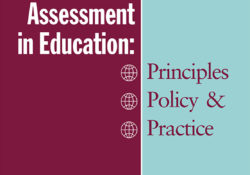tandfonline.com har udgivet en rapport under søgningen “Teacher Education Mathematics”: ABSTRACT ABSTRACT This paper links early foundations in science for young children to the eventual achievement of science literacy for adults. There are five key arguments being made: (i) the early-years foundation stage (EYFS) specialists need to have a view for exactly what foundations are being laid in classrooms; (ii) that they all need to be – minimally – scientifically literate, despite the variety of definitions of that term; (iii) becoming scientifically literate is a long-term process of engaging with and developing an interest in ‘matters scientific’ that are easily available in the public domain; (iv) that there is a plethora of informal learning opportunities in science across the UK to foster adult engagement, and (v) taking a ‘helicopter view’… Continue Reading →
Like this:
Like Loading...
eric.ed.gov har udgivet: Federal policy directed to teaching and teachers is the subject of this review, which is organized around: (1) recruitment; (2) training; (3) accountability; (4) incentives; (5) qualifications; (6) class size reduction; (teacher working conditions; and (8) human resource management and the overall coordination of teacher policy. For each theme, the authors describe past and current federal policy; assess the evidence on policy effects and effectiveness; and conclude with an overall appraisal. Recommendations for future federal teacher policy are provided. Reported observations include: (1) lack of policy research that might supply direction to ongoing policy investments; (2) teaching presents a number of fundamental problems that policy has yet to address successfully; (3) local conditions in schools and districts play a large role in the effectiveness of federal teacher… Continue Reading →
Like this:
Like Loading...

tandfonline.com har udgivet en rapport under søgningen “Teacher Education Mathematics”: ABSTRACT ABSTRACT We discuss oral history interviews with academics who laid the foundation of research and pedagogies in daycare for under three-year-olds in Europe and North and South America since the 1970s. Their work is clearly embedded in the social-political context of their country: the left-wing programmes for disadvantaged families in the U.S.A.; neoliberal policy and daycare because of employment of mothers in the U.S.A.; social-democratic policy and family support in Sweden; and state-controlled institutions for education in socialist-communist East Germany. The interviewees acknowledge the risk of infant daycare for emotional security. Related to values and social context in their country, the interviewees contributed to different interpretations of attachment theory, attachment policies and innovative insights such as multiple attachments, friendship… Continue Reading →
Like this:
Like Loading...
tandfonline.com har udgivet en rapport under søgningen “Teacher Education Mathematics”: Link til kilde
Like this:
Like Loading...
eric.ed.gov har udgivet: Research indicates that effective teachers are critical to raising student achievement. However, there is little evidence about the best ways to improve teacher effectiveness, or how schools that serve the students most in need can attract and retain effective teachers. Traditional salary schedules, which pay teachers based on their years of teaching experience and degree attainment, do not reward effective teaching or provide incentives for the most effective teachers to teach in high-need schools. In 2006, Congress established the Teacher Incentive Fund (TIF), which provides grants to support performance-based compensation systems for teachers and principals in high-need schools. This study focuses on performance-based compensation systems that were established under TIF grants awarded in 2010. It examines grantees’ programs and implementation experiences and the impacts of pay-for-performance bonuses… Continue Reading →
Like this:
Like Loading...
eric.ed.gov har udgivet: Research indicates that effective teachers are critical to raising student achievement. However, there is little evidence about the best ways to improve teacher effectiveness, or how schools that serve the students most in need can attract and retain effective teachers. Traditional salary schedules, which pay teachers based on their years of teaching experience and degree attainment, do not reward effective teaching or provide incentives for the most effective teachers to teach in high-need schools. In 2006, Congress established the Teacher Incentive Fund (TIF), which provides grants to support performance-based compensation systems for teachers and principals in high-need schools. This study focuses on performance-based compensation systems that were established under TIF grants awarded in 2010. It examines grantees’ programs and implementation experiences and the impacts of pay-for-performance bonuses… Continue Reading →
Like this:
Like Loading...
eric.ed.gov har udgivet: The Teacher Incentive Fund (TIF) provides grants to support performance-based compensation systems for teachers and principals in high-need schools. The study measures the impact of pay-for-performance bonuses as part of a comprehensive compensation system within a large, multisite random assignment study design. The treatment schools were to fully implement their performance-based compensation system. The control schools were to implement the same performance-based compensation system with one exception–the pay-for-performance bonus component was replaced with a one percent bonus paid to all educators regardless of performance. This second report provides implementation and impact information. Ninety percent of all TIF districts in 2012-2013 reported implementing at least 3 of the 4 required components for teachers, and only about one-half (52 percent) reported implementing all four. This was a slight improvement… Continue Reading →
Like this:
Like Loading...
eric.ed.gov har udgivet: The Teacher Incentive Fund (TIF) provides grants to support performance-based compensation systems for teachers and principals in high-need schools. The study measures the impact of pay-for-performance bonuses as part of a comprehensive compensation system within a large, multisite random assignment study design. The treatment schools were to fully implement their performance-based compensation system. The control schools were to implement the same performance-based compensation system with one exception–the pay-for-performance bonus component was replaced with a one percent bonus paid to all educators regardless of performance. This second report provides implementation and impact information. Ninety percent of all TIF districts in 2012-2013 reported implementing at least 3 of the 4 required components for teachers, and only about one-half (52 percent) reported implementing all four. This was a slight improvement… Continue Reading →
Like this:
Like Loading...
tandfonline.com har udgivet en rapport under søgningen “Teacher Education Mathematics”: Link til kilde
Like this:
Like Loading...
eric.ed.gov har udgivet: The Teacher Incentive Fund (TIF) provides grants to support performance-based compensation systems for teachers and principals in high-need schools. The goal of the grants is to increase the number of high-performing teachers in high-need schools by rewarding educators for improving students’ achievement. The report on which this snapshot is based describes TIF implementation in all 2010 TIF districts and analyzes, in greater detail, the implementation and impacts of pay-for-performance in 10 evaluation districts that implemented the TIF program for three years. Using information from the first (2011-2012), second (2012-2013), and third (2013-2014) years of TIF implementation, the report addresses the following four questions: (1) What are the characteristics of all 2010 TIF districts and their performance-based compensation systems? What implementation experiences and challenges have TIF districts encountered?;… Continue Reading →
Like this:
Like Loading...



